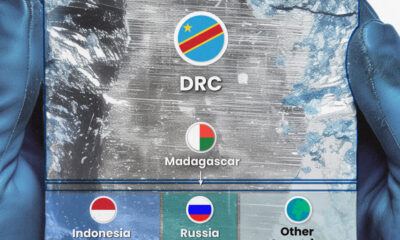Alan Kennedy
2024-06-27 14:55:24
www.visualcapitalist.com
Why Direct Lithium Extraction Could Power the Next Decade of EVs
Transport is changing, and with more and more EVs zipping through the streets, lithium is fast becoming one of the world’s most critical minerals because of its importance for batteries.
However, mining and refining lithium is complicated, time-consuming, and potentially environmentally damaging.
So, for this graphic, Visual Capitalist has partnered with EnergyX to explore three reasons why direct lithium extraction (DLE), an efficient method of mining and refining lithium, could help power the next decade of EVs.
1: DLE Cuts Extraction Times
Over 40 million EVs will be sold annually by 2030, over 10 times the amount sold in 2022, placing incredible demand on lithium production.
| Year | EV Sales Total |
|---|---|
| 2020 | 3,158,700 |
| 2023 | 14,385,660 |
| 2025F | 22,449,800 |
| 2030F | 44,702,000 |
| 2035F | 64,280,000 |
Note: These are combined sales and forecasts for BEV, PHEV, and FCEV cars, trucks, vans, and buses.
Typically, extracting a metric ton of lithium takes between 18 and 24 months using conventional methods. However, using direct lithium extraction, the same amount can be sourced in as little as one or two days, making it much more efficient in supplying the lithium to power the next wave of EVs.
2: DLE Could Bridge the Lithium Supply Gap
The incredible demand placed on the lithium industry could also lead to an over 1.4 million metric ton supply deficit by 2030 if no additional production is brought online.
| 2030 Supply | 2030 Demand | |
|---|---|---|
| LCE (million metric tons) | 1.64 | 3.06 |

EnergyX’s proprietary direct lithium extraction technology, LiTAS , can increase lithium production by up to 300% over conventional methods and potentially improve lithium supplies.
, can increase lithium production by up to 300% over conventional methods and potentially improve lithium supplies.
3: DLE Improves Battery Capacity
Blocks of lithium batteries power many EVs, so as these vehicles become more advanced and more people drive them, the demand for higher-density lithium batteries will only grow. In fact, between 2022 and 2030, the demand for energy stored by lithium batteries will increase by 27% annually.
| Year | Battery Demand (GWh) |
|---|---|
| 2022 | 700 |
| 2025 | 1,700 |
| 2030 | 4,700 |
EnergyX’s DLE technology, LiTAS , which enables lithium metals to be applied directly to a battery’s anode, can significantly improve energy density and pave the way for the next generation of EVs.
, which enables lithium metals to be applied directly to a battery’s anode, can significantly improve energy density and pave the way for the next generation of EVs.
Direct Lithium Extraction: Powering Tomorrow’s Transport
Direct lithium extraction is faster and more productive. It can create more energy-dense batteries, making it the perfect method for gathering the lithium required to power the next chapter of personal transport.
The companies that fueled early internal combustion engine vehicles exploded in value. Now, those powering tomorrow’s EVs could experience the same growth. EnergyX is one such company whose share price has grown 10x since its initial offering.


Join GM and other investors by becoming an EnergyX shareholder.
-

 Mining3 weeks ago
Mining3 weeks agoVisualizing Raw Steel Production in 2023
China produces more than half the world’s steel.
-

 Mining4 weeks ago
Mining4 weeks agoVisualizing Cobalt Production by Country in 2023
The Democratic Republic of Congo accounts for 74% of the world’s cobalt output.
-

 Energy1 month ago
Energy1 month agoRanked: The World’s Largest Lithium Producers in 2023
Three countries account for almost 90% of the lithium produced in the world.
-

 Mining1 month ago
Mining1 month agoThe Biggest Salt Producing Countries in 2023
In this graphic, we break down global salt production in 2023. China is currently the top producer, accounting for almost 20% of output.
-

 Mining2 months ago
Mining2 months agoVisualizing Copper Production by Country in 2023
Chile and Peru account for one-third of the world’s copper output.
-

 Mining2 months ago
Mining2 months agoWhere the World’s Aluminum is Smelted, by Country
This infographic shows estimated aluminum smelter production by country in 2023, based on data from the USGS.
The post Three Reasons Why Direct Lithium Extraction Could Fuel the Next Decade of EVs appeared first on Visual Capitalist.





























































![PANIC!!! UFO Sightings OVER Oregon! [UFO SPLIT's APART] Family Reaction! 2015](https://techcratic.com/wp-content/uploads/2024/11/1732693864_maxresdefault-360x180.jpg)









